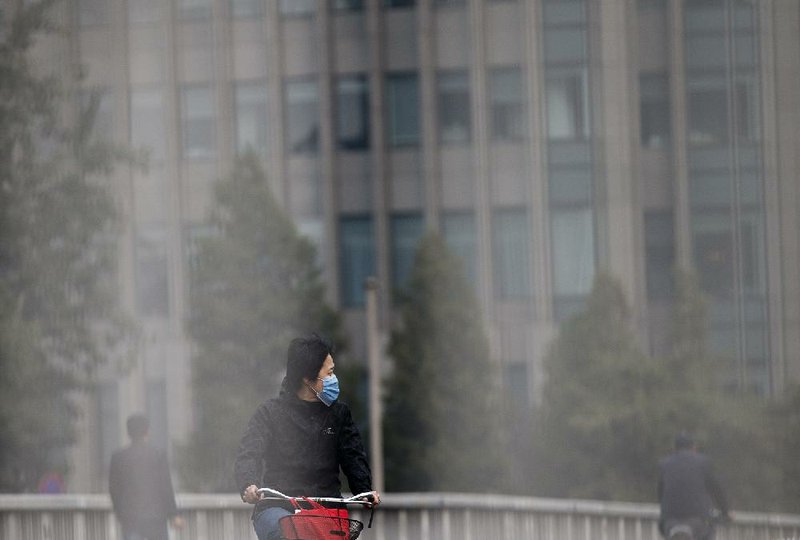BEIJING - Thick, choking smog enveloped cities in northeast China for a second day Tuesday, closing schools, airports and highways, snarling traffic and reducing visibility in some places to a few yards.
In the industrial city of Harbin, home to more than 10 million people, the PM 2.5 level of fine particulate matter in the air reached 1,000 micrograms per cubic meter in parts of the city Monday, 50 times higher than what the World Health Organization considers safe.
Vehicles crawled through the smog with fog lights on or emergency lights flashing. Buses were canceled and a major highway was closed, while hospital admissions soared by 30 percent, local media reported.
Visibility was so low in the city, about 780 miles northeast of Beijing, that two city buses got lost on their regular routes. Pedestrians wore masks or clutched their hands in front of their faces in an effort to breathe more easily.
“I did not even dare to cross the street,” said Zhang Xiaofeng, a 24-year-old bulldozer driver who said his eyes hurt and he was coughing because of the smog. “I waited and waited at the intersection and looked again and again, but I couldn’t see if any cars were coming. Even the traffic lights were invisible.”
Although the air quality had improved by lunchtime, the fog descended again in the afternoon. Primary and middle schools and the airport remained closed.
“I can’t even see the next apartment building next to mine, which is only 10 or 20 meters away,” said 42-yearold housewife Li Li. “I’m not going out, and I won’t let my child go out.”
In the city of Changchun,which is 180 miles closer to Beijing by road, the particulate-matter reading peaked at 700 in some areas Tuesday, and the airport was closed for several hours.
On the Weibo microblogging service, one resident of Harbin complained of having been forced to walk to work through the smog with stinging eyes and throat because buses were canceled and cabs were hard to find.
“The weather made me panic, I even wonder if human beings will become extinct or not,” she posted under the user name “AlwaysBelieveIn.”
The local government blamed the widespread use of coal-fired heaters for the smog as temperatures dropped in China’s colder northeast, as well as straw-burning in surrounding villages at the end of the harvest season.
“I live in a country making people desperate,” posted another Weibo user. “The environmental pollution is not scary. What’s scary is the no-action government and the silence of people like slaves.”
China’s dash for economic growth has badly damaged the environment, and the rapid deterioration in air and water quality increasingly has become a source of public unrest. As a result, improving environmental standards has become a priority for the government.
Last month, China unveiled its most ambitious plan yet to reduce air pollution, calling for significant cuts in coal use in industrial regions in the country’s north, and targeting an overall improvement in particulate-matter levels of 10 percent over five years.
Beijing, routinely blanketed by a gray smog, has also made a “declaration of war” on air pollution. This month, it said it would close schools and factories and further restrict car use - allowing only odd- or even-numbered license plates to drive at specific times - when pollution reaches dangerous “red alert” levels.
“The central government has recognized the fundamental cause - which is its overuse of coal - and what sort of solution should be taken,” said Huang Wei, of the environmental group Greenpeace in Beijing. But Huang said the plan did not go far enough in addressing the problem nationally. As a result, she said, “more and more places are going to have bad air-quality days.”
Previous efforts to improve air quality have foundered because of poor implementation by local governments, which continue to protect heavy industries and tolerate widespread violation of environmental norms, said Ma Jun, director of the Institute of Public & Environmental Affairs in Beijing.
Wang Tao, a climate and energy specialist at Carnegie-Tsinghua Center for Global Policy in Beijing, said large-scale investments in heavy industries as part of a recent economic stimulus plan meant any cuts in coal use would be hard to achieve.
Front Section, Pages 8 on 10/23/2013
